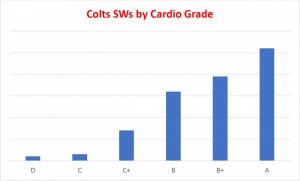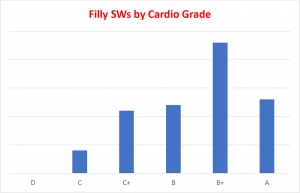The sales of 2-year-olds in training could hardly have had a more robust promotion than the results of racing over the weekend. One sales horse from the Ocala Breeders' Sales Company's postponed April sale that was conducted in June won the Grade 1 Los Alamitos Starlet, while another sold at the auction won the G2 Remsen in New York. In addition, a filly from Fasig-Tipton's Midlantic sale at Timonium won the restricted Fifth Avenue division of the New York Stallion Stakes.
A poster pony for in-training sales success, Varda (by Distorted Humor) was a star at the OBS sale held in June (not the OBS June sale that was held in July this crazy year). The progressive filly was an excellent example of her sire's best sort of prospect, with the strength and speed of a serious athlete. Varda flamed a quarter-mile in :20 4/5 for her under-tack work, and she sold like the star she has become.
Part of the Niall Brennan sales consignment, Varda brought $700,000 from Donato Lanni, agent for Baoma Corp. The dark bay filly has now won two of her three starts, is a Grade 1 winner and Grade 2-placed, and has earnings of more than a quarter-million.
Bred in New York by Masters 2013 LLC and Distorted Humor Syndicate, Varda was a $100,000 yearling at the New York select sale at Saratoga. Then brought to the in-training sales, this filly looked so good and worked so impressively that she generated one of the greatest markups of the resale market in Ocala this year.
In marked contrast, the Remsen winner Brooklyn Strong (Wicked Strong) was a $30,000 weanling at the Fasig-Tipton Saratoga fall sale, then was a $42,000 RNA the following year at the same New York-bred select sale where Varda sold for six figures. Brought back to the sales ring two months later in Ocala for the OBS October yearling sale, Brooklyn Strong was an RNA for $6,000 this time. In his final brush with the sales, Brooklyn Strong sold for $5,000 at the OBS spring sale of 2-year-olds in training, held in June.
Coming out of the same massive sale, both Varda and Brooklyn Strong became graded stakes winners the same weekend on opposite coasts. The polar difference in their prices was significantly dependent on the appeal of their sires. Whereas Varda's sire Distorted Humor is the source of classic winners and champions, Wicked Strong (Hard Spun) bred 54 mares earlier this year, as his appeal to owners and buyers began to wane, and the horse was moved to Pin Oak Lane Farm in Pennsylvania in October for the 2021 season.
Brooklyn Strong is his sire's third stakes winner from two crops of racing age and the first graded stakes winner.
Despite the differences in price and sire power between the Starlet winner and the star of the Remsen, there are also some important similarities. Varda worked like a wonder, and Brooklyn Strong worked quite well, going a furlong in :10 2/5. In contrast to these quick workers, the winner of the Fifth Avenue, Laobanonaprayer, went relatively slow. That filly, by the sensational freshman sire Laoban (Uncle Mo), worked a quarter in :22 3/5, which is plenty quick for racing but not for a sales work. The sales price reflected that, and the big, scopy filly went through the ring for only $15,000 to owner-trainer Daniel Velazquez, who also trains Brooklyn Strong.
One of the reasons that I know so much about these sales horses is my work with DataTrack International, evaluating workouts, strides, efficiency, and athletic potential. One of the measures that DataTrack uses to evaluate horses is a proprietary item called BreezeFigs, which are essentially speed figures for workouts.
Using BreezeFigs, Varda scored a 70, Brooklyn Strong got a 68, and Laobanonaprayer had a 56. Several factors go into the computation of the BreezeFigs, aside from the raw time of the work. Rather than the high speed of the first two, Laobanonaprayer has the rather loping stride of a filly who should be even better going farther; that's how she won the Fifth Avenue, looping her rivals on the turn and loping past them, then keeping up those big, easy strides as she pulled away to win by eight lengths as the even-money favorite.
Another similarity of these quality racehorses is that each of them showed a stride length that was longer than 24 feet in their works. A really good racehorse has to cover the ground faster than its rivals. To do that, it either has to stride farther or to stride faster. The super-powered sprinters tend to throw in more strides, while the stayers tend to stretch out farther. The ones who can keep it up are the ones who end up in the winner's circle.
The post Bloodlines Presented By Diamond B Farm’s Rowayton: Shuffled Juvenile Sale Calendar Doesn’t Change Success Of Grads appeared first on Horse Racing News | Paulick Report.
 system and published daily since 2005 by Daily Racing Form online (
system and published daily since 2005 by Daily Racing Form online (

